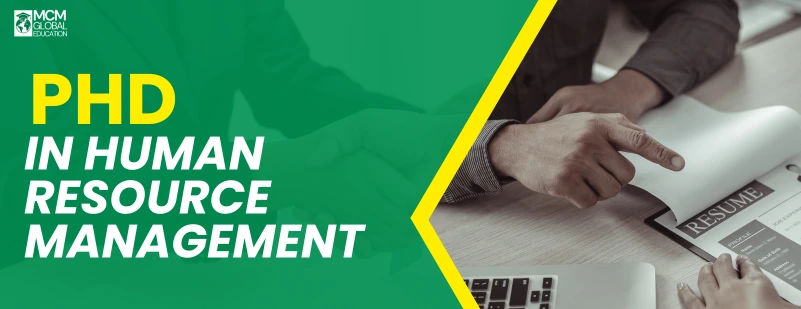Pursuing a PhD in Human Resource Management (HRM) is an excellent choice for professionals and researchers who want to specialize in the complexities of managing people, organizational culture, labor relations, and leadership strategies. A PhD in this domain prepares candidates for careers in academia, corporate leadership, policy-making, and advanced consultancy.
In today’s globalized economy, human capital is the most valuable asset for organizations. Hence, human resource management (HRM) has evolved from being an administrative function to a strategic driver of business success. With rapid technological advancement, remote work models, AI-driven recruitment, and employee well-being programs, HR is at the forefront of shaping the workforce of the future.
This blog provides a detailed guide on PhD in Human Resource Management, covering eligibility, syllabus, research topics, top universities, career scope, and salary prospects.
Table of Contents
What is a PhD in Human Resource Management?
A PhD in Human Resource Management is a research-oriented doctoral program that focuses on advanced HR theories, strategic workforce management, labor laws, organizational behavior, and employee development. The program emphasizes academic research, critical thinking, and analytical problem-solving skills.
Unlike MBA or Master’s degrees, a PhD goes beyond managerial skills to explore new theories, conduct empirical research, and contribute knowledge to the HRM field.
Eligibility Criteria for PhD in Human Resource Management
The general eligibility criteria for a PhD in Human Resource Management vary across universities, but here are the common requirements:
| Criteria | Details |
|---|---|
| Educational Qualification | Master’s degree in HRM, Management, Business Administration, or a related field with at least 55%–60% marks |
| Entrance Exams | GRE/GMAT (for international programs), UGC-NET/JRF (India), or university-specific entrance tests |
| Work Experience | Preferred but not mandatory; academic and research background helps |
| Language Proficiency | IELTS/TOEFL for international students (if applicable) |
| Research Proposal | A detailed statement of research intent is usually required |
PhD in Human Resource Management Syllabus
The syllabus for PhD in HRM focuses on advanced concepts in management theory, labor relations, organizational psychology, leadership, and quantitative research. Below is a structured breakdown:
| Semester | Core Subjects |
|---|---|
| Semester 1 | Advanced Organizational Behavior, Research Methodology, Strategic HRM |
| Semester 2 | Quantitative & Qualitative Research Methods, Employee Relations, HR Analytics |
| Semester 3 | Talent Management, Leadership Studies, Performance Measurement |
| Semester 4 | Labor Laws & Industrial Relations, Compensation Management, Global HR Practices |
| Semester 5 | Electives + Dissertation Work |
| Semester 6–8 | Research Work, Thesis Writing, Defense |
Top Universities for PhD in Human Resource Management
Global Universities
| University | Location | Duration |
|---|---|---|
| Harvard Business School | USA | 5–6 Years |
| London School of Economics (LSE) | UK | 4–5 Years |
| INSEAD Business School | France/Singapore | 4–6 Years |
| University of Melbourne | Australia | 4 Years |
| National University of Singapore (NUS) | Singapore | 4–5 Years |
Top Indian Universities
| University | Location | Duration |
|---|---|---|
| Indian Institute of Management (IIM-A, IIM-B, IIM-C) | India | 4–5 Years |
| XLRI – Xavier School of Management | Jamshedpur | 4–5 Years |
| Tata Institute of Social Sciences (TISS) | Mumbai | 4–5 Years |
| Delhi University | Delhi | 4–6 Years |
| Jawaharlal Nehru University (JNU) | Delhi | 4–6 Years |
PhD in Human Resource Management: Research Areas & Topics
The most important aspect of a PhD is choosing a research area. Below are trending research topics in HRM:
- Artificial Intelligence in Recruitment and Selection
- Impact of Remote Work on Employee Engagement
- Diversity, Equity, and Inclusion (DEI) Practices in Global Organizations
- Workplace Stress and Employee Well-being
- Performance Appraisal Systems and Employee Productivity
- The Role of HR Analytics in Strategic Decision Making
- Employer Branding and Talent Retention Strategies
- Sustainable HRM Practices and Green Workplaces
Career Scope After PhD in Human Resource Management
A PhD in HRM opens up both academic and corporate career opportunities. Here’s a breakdown:
Academic Careers
- Professor / Lecturer in HRM
- Researcher & Author
- HR Policy Analyst
Corporate Careers
- HR Director / Chief Human Resources Officer (CHRO)
- HR Strategy Consultant
- Talent Acquisition Specialist (Global)
- Employee Experience & Engagement Manager
- Organizational Development Expert
Salary After PhD in Human Resource Management
The salary package after completing a PhD in HRM depends on the role, experience, and country.
| Role | Average Salary (India) | Average Salary (US/UK) |
|---|---|---|
| Assistant Professor | ₹8–12 LPA | $70,000–$100,000 |
| HR Consultant | ₹10–15 LPA | $90,000–$120,000 |
| HR Director | ₹25–40 LPA | $120,000–$180,000 |
| CHRO | ₹50 LPA+ | $200,000+ |
| Research Scientist | ₹12–20 LPA | $80,000–$110,000 |
Skills Required for PhD in Human Resource Management
To excel in this program, candidates must develop the following skills:
- Research & Analytical Skills – for data-driven HR solutions
- Leadership Skills – to guide teams and influence decisions
- Communication Skills – for effective teaching and consultancy
- Technological Competence – knowledge of HR analytics, AI, and HR software
- Problem-Solving Abilities – for tackling complex organizational issues
Advantages of Pursuing a PhD in Human Resource Management
- High-Level Expertise – positions you as a subject-matter expert
- Academic Contribution – opportunity to publish research papers & books
- Corporate Leadership – access to top management positions
- Global Recognition – demand for HR scholars worldwide
- Networking Opportunities – connect with industry leaders and academics
Challenges in Pursuing a PhD in HRM
While rewarding, pursuing a PhD in Human Resource Management is not without challenges:
- Time-Consuming – requires 4–6 years of dedicated effort
- Extensive Research – candidates must publish in reputed journals
- Financial Investment – high tuition fees in global universities
- Work-Life Balance – intense workload during dissertation phase
Comparison: PhD in Human Resource Management vs MBA in HR
| Parameter | PhD in HRM | MBA in HR |
|---|---|---|
| Focus | Research & Academics | Professional & Managerial Skills |
| Duration | 4–6 Years | 2 Years |
| Career Path | Academia, Research, Top Leadership | Mid-Senior HR Roles |
| Eligibility | Master’s + Entrance | Bachelor’s + Entrance |
| Average Salary | Higher in long run | Higher initially |
Future of PhD in Human Resource Management
The future of HRM research is bright, as organizations are rapidly adapting to:
- Digital HR platforms (AI-driven HR systems)
- Globalized Workforce with remote and hybrid models
- Employee-Centric Policies focusing on well-being and retention
- Data-Driven Decision Making through HR analytics
PhD scholars will play a crucial role in shaping the HR landscape, ensuring that organizations adapt to these transformations with evidence-based strategies.
Conclusion
A PhD in Human Resource Management is an excellent choice for individuals who want to make a difference in academia, research, and corporate leadership. With growing demand for HR specialists who can blend people management with strategic insights, the scope of this degree is vast and rewarding.
Whether you aim to become a professor, CHRO, or HR consultant, a PhD provides the knowledge, credibility, and career growth opportunities necessary to thrive in today’s dynamic HR landscape.























